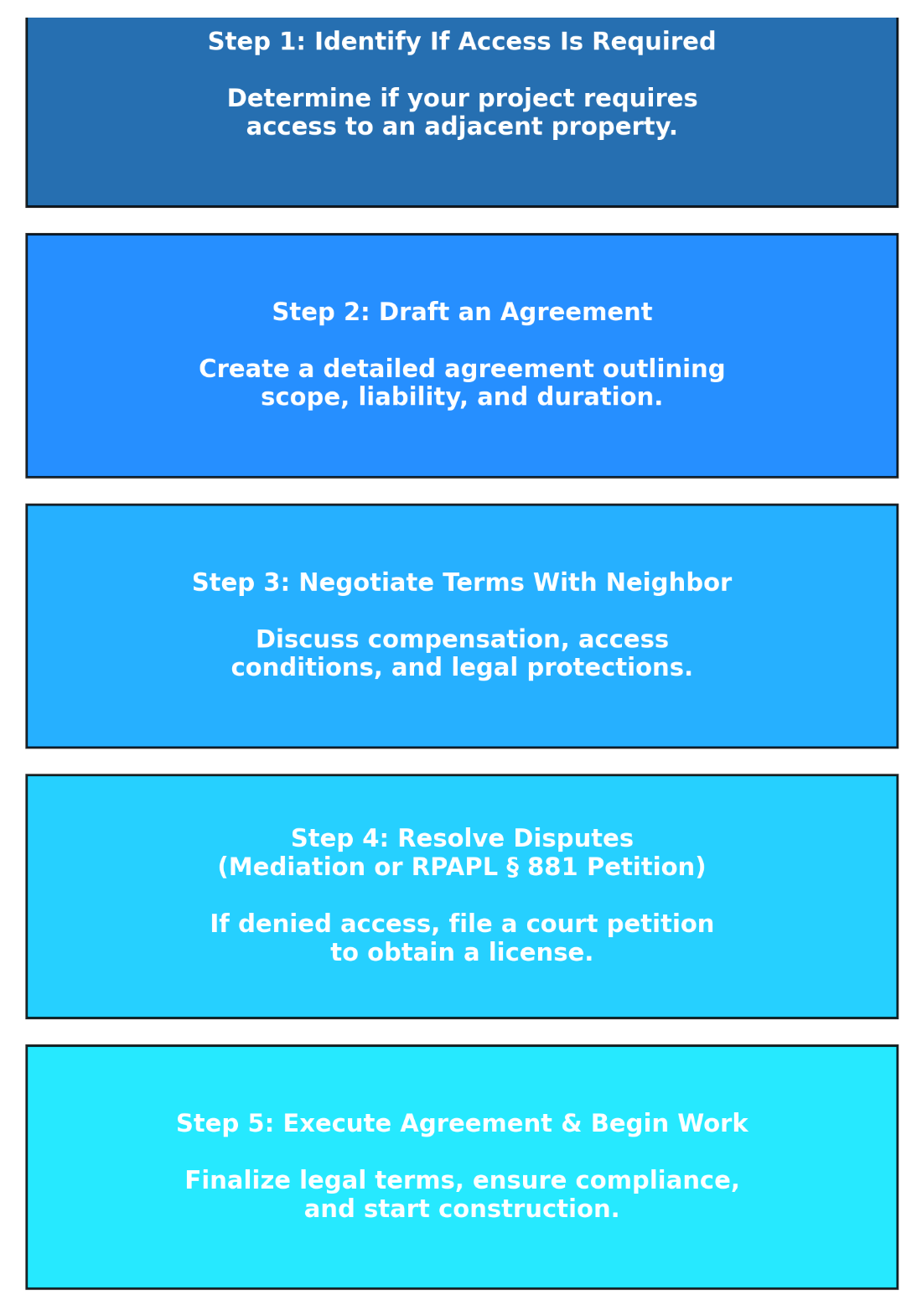When construction takes place in New York City, developers often require access to neighboring properties. If you’re an adjoining property owner, it’s important to understand your rights and obligations when such access is requested. This guide explains what construction access agreements are, when they’re needed, and how to protect your property.

What Is a Construction Access Agreement?
A construction access agreement is a written contract that allows a developer to enter, use, or temporarily occupy a neighboring property to perform construction-related work. This may include:
- Installing protective measures like scaffolding or netting
- Entering your roof, terrace, or yard
- Accessing walls for inspection or repair
These agreements are negotiated between the developer (or property owner conducting the construction) and the adjoining property owner.
When Is an Access Agreement Required?
An access agreement is typically needed when:
- A construction project is occurring within close proximity to a property line
- The work involves excavation, underpinning, or demolition
- Scaffolding, swing staging, or shoring needs to be installed on a neighbor’s property
If you are not willing to grant access voluntarily, the developer may petition the court under RPAPL §881 to obtain a license.
What Is RPAPL §881?
Section 881 of the New York Real Property Actions and Proceedings Law (RPAPL) allows a developer to request a license from the court to access a neighbor’s property when access is reasonably necessary for construction.
The court may grant the license if the work cannot be completed without access and the adjoining owner is unwilling to consent voluntarily. Courts generally impose conditions to protect the neighbor, such as:
- Limiting the duration and scope of access
- Requiring insurance coverage
- Ordering payment of license fees
- Requiring the developer to cover the neighbor’s legal and engineering fees
Key Terms to Include in an Access Agreement
When negotiating an access agreement, adjoining owners should consider including terms that:
- Limit the scope of access to specific work and areas
- Set strict timeframes and require notice before access begins
- Require insurance with the neighbor named as an additional insured
- Indemnify the neighbor from liability or damage
- Provide license fees to compensate for use of the property
- Cover professional fees, including attorneys, engineers, and consultants
If you need assistance drafting or negotiating an access agreement, James J. Corbett, P.C. can help protect your interests and ensure a fair and effective agreement. Contact us today to learn more our construction access agreement services in NYC.
Why Legal Counsel Is Important
An access agreement is a binding legal contract. Without careful negotiation, you could expose yourself to risk, property damage, or prolonged inconvenience.
Legal counsel ensures:
- The agreement complies with applicable laws and codes
- Your rights are fully protected
- The developer’s obligations are clear and enforceable
At James J. Corbett, P.C., we represent adjoining owners throughout New York City. We negotiate access agreements that protect our clients’ interests, minimize disruption, and ensure fair compensation.
Frequently Asked Questions (FAQ)
Do I have to allow my neighbor access for construction?
No. You don’t have to agree voluntarily unless a court orders it under RPAPL §881. You have the right to set terms.
What happens if I refuse access?
If you refuse access, the developer may file a petition under RPAPL §881. The court will decide if access is necessary and may set conditions.
Who pays the legal and engineering fees?
The developer usually pays those costs, especially in RPAPL §881 cases.
Can I charge a license fee?
Yes. Courts may require payment, and most negotiated agreements include license fees for access.
What if the developer causes damage?
A well-drafted agreement includes insurance requirements and indemnification clauses to protect you against damage or liability.
Need Help with an Access Agreement?
Contact James J. Corbett, P.C. to schedule a consultation. We’ll help you understand your rights and negotiate an agreement that works for you.
Call (516) 679-9494 or visit jamesjcorbett.com to learn more.
